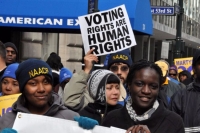As important as Social Security is for virtually all of today’s older Americans—and will be in the future—there is still much to be done to achieve the promise of economic security in old age. Expanding Social Security is important for all of us, but it is especially important for five groups of older Americans: women; people of color; the LGBT community; low-wage workers and early retirees; and the oldest old.
1. Women: Women are at greater risk, even with Social Security, than men are of entering old age in precarious financial circumstances or of suffering large declines in income and possible impoverishment. Persistent gender gaps in wages, societal expectations that women will leave work to perform care-giving duties (for both children and aging parents), greater longevity, and lower rates of private pensions and savings compared to men all contribute to this increased risk. Because of their longer average life expectancies, women are also at greater risk of outliving their resources, as well as having them greatly erode in value, since—with the exception of their Social Security—what supplemental pensions they do have are generally not protected against inflation.
Women comprise 56 percent of Social Security beneficiaries age 62 and over, and almost 67 percent of beneficiaries age 85 and older. Single women age 65 and older received 50.4 percent of their income from Social Security, compared to 35.9 percent for elderly single men and 32 percent for elderly couples. Without Social Security, the poverty rate among older women, according to the official poverty measure, would increase from the current 11 percent to 48 percent. But, as the upcoming story of Theresa B. illustrates, even with Social Security, the economic status of women can be precarious, especially for those who are single as a result of divorce, the death of a spouse, or never marrying. The poverty rates for such women are among the highest for any subgroup in the country. While the poverty rate for a married couple (over age65) is only 5.4 percent, the poverty rate for a woman living alone (over age 65) is 18.9 percent.
The Case of Theresa
Theresa is a 59-year-old college-educated white woman living in Rainbow City, Alabama. She married at age 25 but was divorced at 30. She remarried at 33 and has two children from that marriage. Her husband, a building contractor, left her eight years later. She managed to get child support and half their savings of $25,000, which helped her get by while the children were young. She has worked as a preschool teacher and also selling cosmetics at a department store. However, she has not held a full-time job since 2000, when her mother developed cancer and required Theresa’s full-time care. Her mother is now deceased, but Theresa still lives with her father, a former mechanic who is 92 and requires constant care. As Theresa approaches her own retirement years, she has no savings and no supplemental pension. Her father receives a monthly Social Security benefit of $1,100. (In 2014, his Medicare Part B premium, which is deducted directly from his check, reduced his monthly benefit by $104.90, and out-of-pocket health care costs take a bigger bite each year since they are outpacing his annual cost of living increases.) Because Theresa was not married to either of her former spouses for at least ten years, she is ineligible for spousal benefits and must qualify for Social Security solely on her own limited earnings record. According to her most recent Social Security earnings statement, Theresa’s Social Security would be $985 a month if she waits until age 66 to start her benefit, but less than $738 a month if she takes her Social Security when she turns 62, which she thinks she will need to do.
2. People of Color: Similarly, Social Security is extremely important to African Americans, Hispanics, and other people of color. Disadvantaged minority populations are more likely to have lower lifetime earnings, due to a variety of factors, including lower educational attainment, employment discrimination, physically challenging employment, and higher rates of unemployment. They are also more likely to suffer disabilities.
Social Security is designed to provide economic protection against these disadvantages. It especially benefits those who have lower lifetime earnings and longer periods of unemployment. Moreover, Social Security protects workers and their families economically against the risks of disability and premature death. Social Security is also particularly important to minority workers and their dependents because they have far lower rates of employer-provided retirement, life, and disability insurance coverage.
In 2012, among beneficiary households with at least one person age 65 or over, Social Security provides at least 90 percent of the income for 46 percent of African Americans, 53 percent of Latinos, and 44 percent of Asians. Without Social Security, the poverty rate among African American seniors would triple, from 17 to 50 percent, and the poverty rate among Hispanic American seniors would rise from 19 to 50 percent. Because of their poorer health and more physically demanding jobs, these groups tend to rely more heavily on Social Security’s disability and survivor protections as well.
3. LGBT community: Because members of the LGBT community also suffer discrimination in the workplace, Social Security is particularly important to them as well. Indeed, as a result of the so-called Defense of Marriage Act, members of this community who were committed to each other nevertheless were not entitled to the spouse, divorced spouse, and widow(er) protections that heterosexual couples enjoyed.
Thanks to the recognition of same-sex marriages in more and more states, together with the 2013 Supreme Court case holding unconstitutional major parts of the Defense of Marriage Act, these protections are now increasingly available for this segment of the American community, but much still needs to be done to assure their equal treatment.
4. Low-wage workers and many early retirees: Many of today’s seniors who accepted permanently reduced Social Security benefits are also at special risk. The vast majority of Social Security retirees in 2009—2 million out of 2.7 million—accepted permanently reduced benefits before reaching the full retirement age of 66. Nearly half, 1.3 million, accepted these benefits at age 62, when benefit reductions are largest. Many who have accepted reduced benefits over the years had little or no choice due to health and employment circumstances. Twenty-seven percent of all workers age 60 to 61 report a “work-limiting health condition,” with higher percentages reported for minority workers—36.5 percent of African Americans and 31.5 percent of Latinos.
Moreover, 45 percent of workers age 58 and older work in jobs that are either physically demanding or have other difficult working conditions. These older workers are likely to have great difficulty holding a job and are primed to become disadvantaged retirees.
Social Security’s companion program, Supplemental Security Income (SSI), plays an important role in assisting the most low-income elderly persons. In 2014, SSI provided a federal income guarantee of up to $721 a month for individuals and $1,082 for couples to roughly 8.4 million low-income, severely disabled, blind, or aged (65 and over) people. Some states provide modest supplements on top of the federal guarantee. Even so, SSI fails to provide income that permits more than the bare necessities.
5. The oldest old: The reliance on Social Security is even greater as people age and exhaust other sources of support. For beneficiary households with at least one person age 80 or over, three out of four rely on Social Security for half or more of their income. For almost one out of two—47 percent—Social Security constitutes 90 percent or more of their income. For widowed, divorced, or never-married women, and for people of color, the percentages are even higher at those ages.
Link to original article from AlterNet

















 Imagine going to the polls on Election Day and discovering that your ballot could be collected and reviewed by the
Imagine going to the polls on Election Day and discovering that your ballot could be collected and reviewed by the ACLU Blueprints Offer Vision to Cut US Incarceration Rate in Half by Prioritizing 'People Over Prisons'
ACLU Blueprints Offer Vision to Cut US Incarceration Rate in Half by Prioritizing 'People Over Prisons'  "These disasters drag into the light exactly who is already being thrown away," notes Naomi Klein
"These disasters drag into the light exactly who is already being thrown away," notes Naomi Klein  How about some good news? Kansas Democratic Representative advances bill for Native Peoples.
How about some good news? Kansas Democratic Representative advances bill for Native Peoples.  What mattered was that he showed up — that he put himself in front of the people whose opinions on
What mattered was that he showed up — that he put himself in front of the people whose opinions on On a night of Democratic victories, one of the most significant wins came in Virginia, where the party held onto
On a night of Democratic victories, one of the most significant wins came in Virginia, where the party held onto A seismic political battle that could send shockwaves all the way to the White House was launched last week in
A seismic political battle that could send shockwaves all the way to the White House was launched last week in In an interview with Reuters conducted a month after he took office, Donald Trump asserted that the U.S. had “fallen
In an interview with Reuters conducted a month after he took office, Donald Trump asserted that the U.S. had “fallen Attorney General Jeff Sessions overturned the sweeping criminal charging policy of former attorney general Eric H. Holder Jr. and directed
Attorney General Jeff Sessions overturned the sweeping criminal charging policy of former attorney general Eric H. Holder Jr. and directed Why did Democrats lose on election night? Because not enough of them were fighting for big ideas. As Sen. Bernie
Why did Democrats lose on election night? Because not enough of them were fighting for big ideas. As Sen. Bernie Most Americans want better benefits, and they agree on how to pay for them. As strengthening Social Security becomes a
Most Americans want better benefits, and they agree on how to pay for them. As strengthening Social Security becomes a